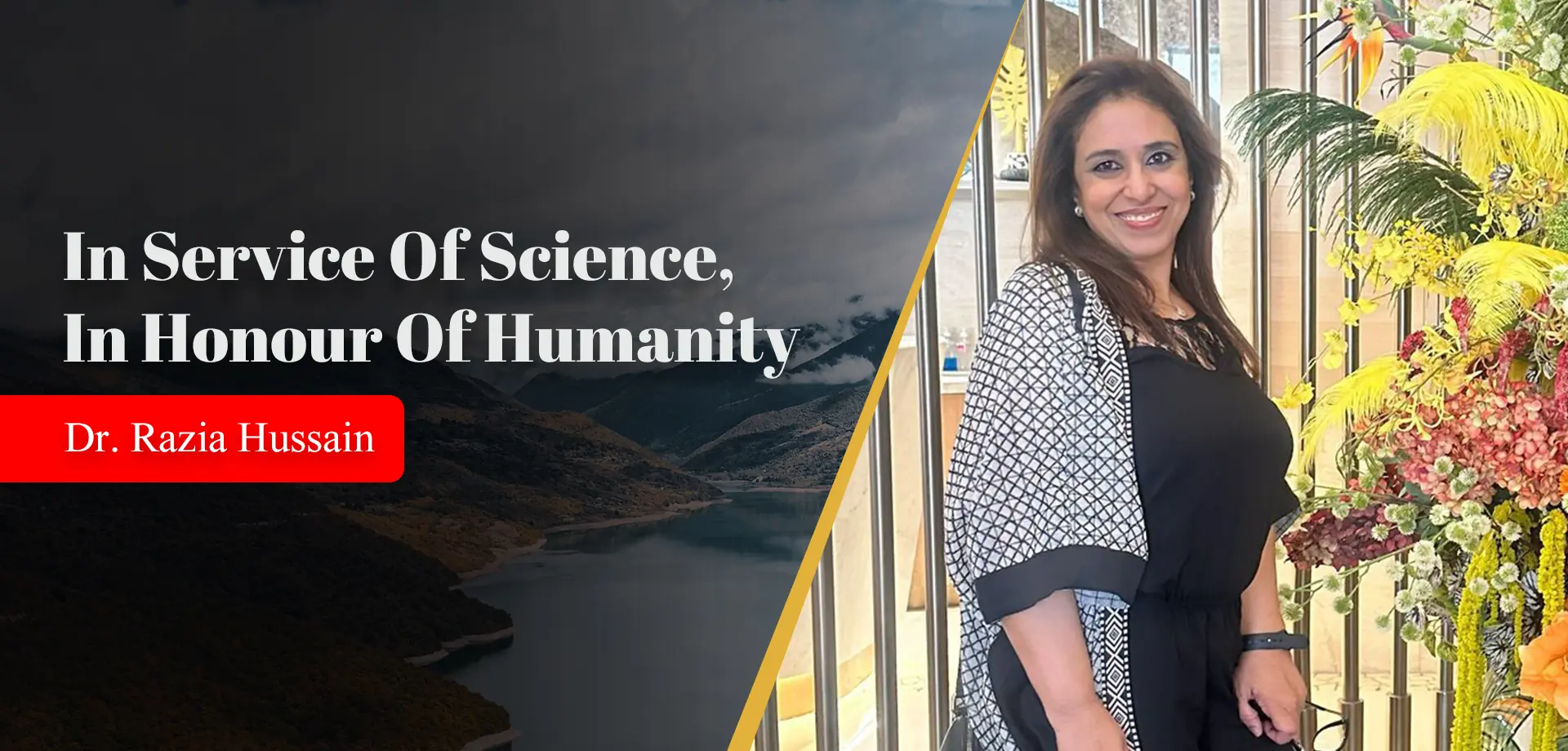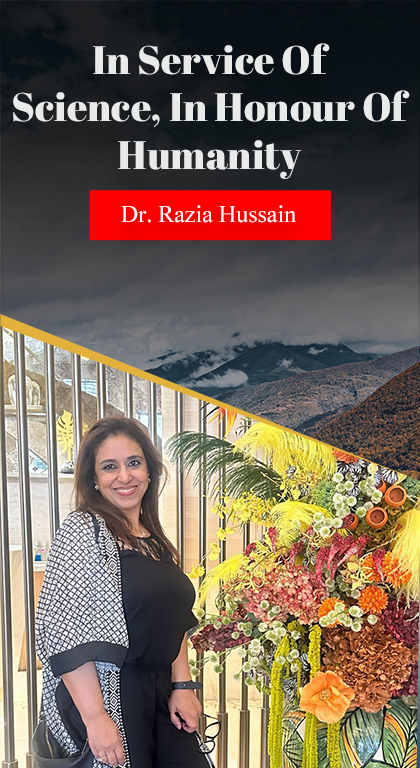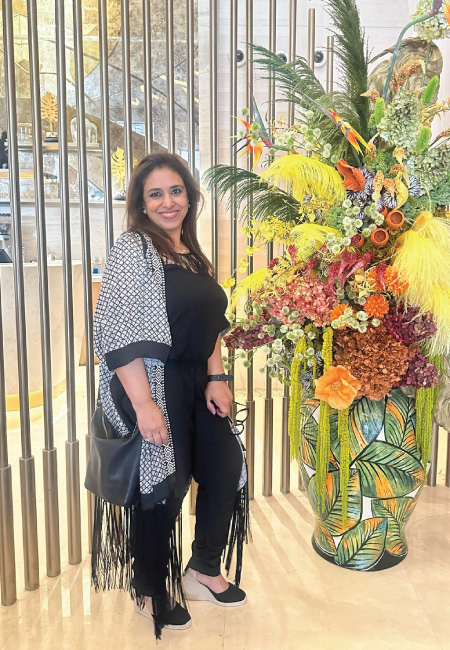

"See the glass half full, and fill the rest with purpose—one small act, one day at a time."
Introduction
To speak of Dr. Razia Hussain is to speak of resilience refined by purpose, leadership sharpened by service, and brilliance illuminated by compassion. Her story is not one that begins with privilege or convenience—it begins with resolve, with a determination to rise in a world where ambition alone was never enough.
This biography is a tribute to a life carved across continents, woven into the evolving fabric of global pharmaceutical medicine, and anchored in an unwavering belief: that excellence and empathy are not mutually exclusive, but fundamentally intertwined.
Dr. Hussain’s journey spans more than 25 years of excellence across an array of domains—clinical research, medical affairs, regulatory science, pharmacovigilance, digital health strategy, people development, and corporate governance. From the laboratories of Johannesburg to the executive boardrooms of Shanghai, Dubai, London, and LATAM, she has stood at the nexus of innovation and impact. She has not only witnessed the global evolution of medicine—she helped shape it.
But what makes her story especially powerful is not simply the trajectory of her success. It is the intention behind it. She didn’t climb the ladder to sit at the top—she climbed it to build new ladders for others. Her leadership has consistently uplifted individuals, developed teams, and transformed entire divisions. She created systems where compliance didn’t stifle innovation, but protected integrity. She championed patient-centered strategies that became global best practices. And in the most complex and high-risk markets, she led transformations that balanced business with ethics, systems with agility, and data with human dignity.
This biography takes the reader beyond the bullet points of a decorated CV. It opens the doors to the stories behind the milestones—the moments of doubt, the challenges of leading in diverse and volatile markets, the cultural negotiations, the strategic reinventions, and the quiet victories that often go unseen but mean the most.
It traces her rise from a clinical technologist in South Africa to a global executive director steering regional therapeutic portfolios, aligning with global commercial visions, and leading award-winning medical affairs teams in regions often underrepresented on the world stage.
In a world where women—particularly women of colour—often have to fight twice as hard for half the recognition, Dr. Hussain forged her path with grace, intelligence, and the relentless conviction that healthcare leadership must look like the world it serves.
Phase 1 : Humble Beginnings, Towering Dreams
“The journey of a thousand miles begins with a single step.”

In the pulsing heart of Johannesburg, South Africa, during the late 1980s—a time of both great transformation and lingering inequities—a young woman in a white lab coat began a journey that would ripple across the global pharmaceutical and healthcare industries. Dr. Razia Hussain, then simply Razia, was not yet a doctor, not yet a regional director, not yet the powerhouse of medical strategy and excellence she would one day become. But even then, there was something unmistakable in her eyes—a glint of fire, a promise of possibility.
The cold, clinical corridors of Lancet Laboratories, where she began as a Senior Technologist in Haematology, were far from glamorous. Her days began early and ended late, filled with rows of samples, blinking machines clattering centrifuges, and the quiet, concentrated hum of diagnostics at work. While many saw only numbers on a screen or blood cells under a microscope, Dr. Razia saw human stories—families waiting for answers, doctors relying on precision, and lives hinging on accurate data.
This wasn’t just a job for her. It was a sacred responsibility.
Her colleagues would often recall how she approached every vial and every slide with meticulous care—not out of fear of error, but out of deep reverence for human life. That reverence would go on to define her professional ethos for decades to come.
Born into a family where education was revered and values were non-negotiable, Dr. Razia’s early life was marked by a quiet determination. Her parents, though not wealthy, were rich in integrity and vision. They taught her that excellence was not a destination, but a discipline—a daily commitment to being slightly better than yesterday. They did not push her toward success. They instilled in her the tools to earn it.
As a young woman working in an intensely technical, male-dominated space, Dr. Razia faced more than just scientific challenges. She had to navigate gender bias, cultural constraints, and systemic limitations. But where others saw barriers, she saw training grounds for resilience. Each time she was underestimated, she let her performance speak louder than her presence. Each time she was told “this is how it’s always been,” she quietly asked, “But is it how it should be?”
And while her peers might have focused solely on clinical data and lab metrics, Dr. Razia was reading more—medical journals, business case studies, leadership manuals, and papers on pharmacovigilance and clinical ethics. Her mind was stretching beyond the lab—to systems, to structures, to something far greater than the immediate.
Phase 2 : Climbing the Clinical Ladder
"Success is not the key to happiness. Happiness is the key to success. If you love what you are doing, you will be successful.”"

The real measure of a career in clinical research is not just in the studies completed or the milestones met—it is in the lives behind the data, the systems left stronger, and the teams built to last. For Dr. Razia Hussain, the years spent at AstraZeneca South Africa marked the phase where clinical mastery merged with strategic foresight, where her passion for science became a platform for scale.
What began with lab coats and blood samples at Lancet Laboratories would now evolve into complex therapeutic area studies, regulatory frameworks, protocol development, and region-wide orchestration of research trials. South Africa, for her, was no longer just home—it became a hub of innovation, and Dr. Razia was its architect.
Dr. Razia joined AstraZeneca as a Clinical Research Associate, a role that demanded intense focus, precision, and adherence to international standards. But she brought more than what was asked. She brought vision. She understood that the work of a CRA was not limited to site monitoring or data reconciliation—it was about building credibility, forging strong site relationships, and ensuring that science walked hand-in-hand with ethics.
Her deep understanding of clinical protocols, patient safety, and regulatory nuances earned her swift recognition. It wasn’t long before she advanced to become Senior Clinical Research Associate, then Therapeutic Area Manager for Oncology and Inflammation, and ultimately Head of Study Management. With every title change, her scope expanded—but so did her ambition. She wasn’t just climbing a ladder. She was transforming the rungs beneath her into stepping stones for others.
It was during one of the most high-stakes cardiovascular clinical trials that Dr. Hussain’s leadership was tested—and gloriously proven. AstraZeneca had initiated a multinational trial for a critical cardiovascular therapy. Midway, several participating countries were falling behind on recruitment. With timelines slipping and risk mounting, the South African site—under Dr. Razia’s leadership—was designated as a “rescue country.” Where most would see pressure, Dr. Razia saw possibility.
With a team of clinical researchers, investigators, and operational leads, she redesigned recruitment strategies, optimized trial site logistics, and introduced rapid response frameworks that more than doubled expectations. The target was 1,000 randomized patients. Her team delivered 2,497—a 2.5x overachievement, executed with uncompromised accuracy and quality.
Phase 3 : The Strategist Emerges
"In the middle of every difficulty lies opportunity."
The year was 2012, and the world of global pharmaceuticals was entering a period of accelerated complexity. Emerging markets were expanding. Regulatory expectations were tightening. Patient demands were changing. And the need for digital innovation in traditionally paper-heavy systems had never been more urgent.
At this precise inflection point, Dr. Razia Hussain stepped onto a new stage—not as a follower of trends, but as a pioneer of transformation. She had already proven herself in South Africa’s clinical research landscape. Now, in Dubai, she began shaping the strategic future of global medical compliance, digital medical governance, and scalable innovation.
Her role as Medical Compliance Manager for the Middle East & Africa (MEA) at AstraZeneca wasn’t just about enforcing rules—it was about redefining the framework of trust between science, systems, regulators, and society.
Compliance is often seen as the brake in an organization—slowing progress to ensure safety. But under Dr. Razia’s leadership, it became a channel of acceleration, a protector of reputation, and a pathway for sustainable innovation. She entered MEA at a time of uncertainty. Regulatory landscapes were shifting—often without notice. Countries across the Middle East and North Africa were introducing or revising drug safety laws, approval systems, and medical signatory mandates. The stakes were high: without swift adaptation, pharmaceutical companies could lose licenses to operate.
While others saw chaos, Dr. Razia saw opportunity. She swiftly mapped regulatory risk, trained local teams, standardized compliance frameworks, and created corrective and preventive action plans (CAPAs) to ensure no market lagged behind. Her attention to detail was laser-sharp, but her perspective was always wide-angle. She saw the whole chessboard. Her foresight and rapid implementation helped preserve operational continuity in multiple high-risk markets. It wasn’t just a technical win—it was a strategic safeguard for patient access and organizational integrity.
Long before “virtual” became vital during the COVID-19 pandemic, Dr. Hussain was already working on digital transformation. She understood that if science was to remain agile, accessible, and auditable, then digital pathways were essential.